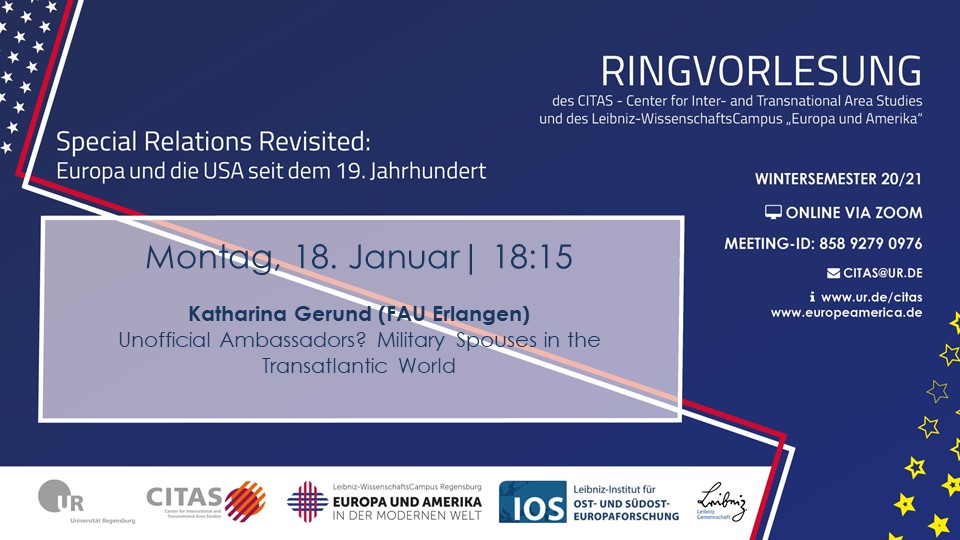Lecture: Unofficial Ambassadors? Military Spouses in the Transatlantic World (Katharina Gerund)
For the lecture series "Special Relations Revisited" Katharina Gerund (FAU Erlangen) takes a closer look at the role of "Military Spouses in the Transatlantic World".
“Unofficial Ambassadors?” Military Spouses in the Transatlantic World
In the context of the so-called Cold War, the US military began to facilitate military spouses joining deployed service members around the globe at a large scale. Military spouses overseas, as Donna Alvah has shown, often became “unofficial ambassadors” of US culture and functioned as agents of soft power diplomacy. My talk will take this postwar role as a starting point and focus on the (partially) new assignments for military spouses since the transformation of the US military to an all-volunteer force and especially in the context of the “Global War on Terror.” Based on the analysis of various cultural representations of military spouses in the 21st century (incl. magazines, life-writing, and fictional portrayals), I will show how (transatlantic) mobility, travel, and cultural contact shape public discourses on and by military spouses. Yet, I argue that military spouses in the cultural imaginary of the US have primarily become unofficial ambassadors stateside, tasked with a double mission: to promote the wars in Afghanistan and Iraq and to bridge the growing “familiarity gap” between civil society and military culture.
Katharina Gerund (FAU Erlangen-Nürnberg) is assistant professor of American Studies at FAU Erlangen-Nürnberg. Her research interests include Americanization and cultural mobility, gender and feminism, and cultures of sentimentality and affect. She is coordinator of the DFG-funded „Global Sentimentality Project“.
„Inoffizielle Botschafter*innen?“ Ehepartner*innen von Militärpersonal in der transatlantischen Welt
Im Kontext des sogenannten Kalten Krieges begann das US-Militär im großen Rahmen damit, die Ehepartner*innen von stationierten Soldat*innen dabei zu unterstützen, sich ihren Gatt*innen vor Ort anzuschließen. Wie Donna Alvah gezeigt hat, wurden military spouses oft zu „inoffiziellen Botschafter*innen“ der amerikanischen Kultur und agierten so durch die soft power der Diplomatie. Mein Vortrag wird diese Nachkriegsrolle als Ausgangspunkt nehmen und sich auf die (zum Teil) neuen Aufgaben für die Ehepartner*innen seit der Umgestaltung des US-Militärs durch die Abschaffung der Wehrpflicht und besonders im Kontext des „Krieg gegen den Terrorismus“ konzentrieren. Basierend auf der Analyse von verschiedenen kulturellen Repräsentationen von militärischen Ehepartner*innen im 21. Jahrhundert (darunter Magazine, life writing, und fiktionale Darstellungen) zeige ich, wie (transatlantische) Mobilität, Reisen und kulturelle Berührungen den öffentlichen Diskurs über und von military spouses geprägt haben. Doch ich argumentiere, dass die Ehegatt*innen in der kulturellen Vorstellung der USA primär zu inoffiziellen Botschafter*innen in den Staaten wurden, wo ihnen ein doppelter Auftrag zukommt: für die Kriege in Afghanistan und im Irak zu werben und die wachsende „Lücke der Vertrautheit“ (familiarity gap) zwischen der Zivilgesellschaft und der Militärkultur zu überbrücken.
Katharina Gerund (FAU Erlangen-Nürnberg) ist wissenschaftliche Mitarbeiterin am Lehrstuhl für Amerikanistik an der FAU. Zu ihre Forschungsinteressen gehören u.a. Amerikanisierung und kulturelle Mobilität, Gender und Feminismus, und Emotionen und Sentimentalität. Sie ist Koordinatorin des durch das DFG-geförderten „Global Sentimentality Project“.
When? Monday, 18 January 2021, 18:15
Where? Online via Zoom, https://uni-regensburg.zoom.us/j/85892790976, Meeting ID: 858 9279 0976
The lecture series "Special Relations Revisited: Europa und die USA seit dem 19. Jahrhundert" investigates how transatlantic relations have changed over the past 200 years. It is organized together with CITAS. Find the full programm here.

